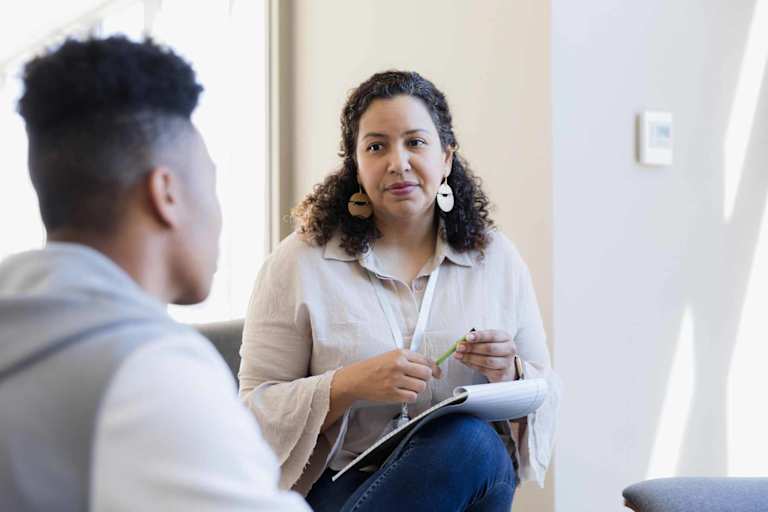The Best Online Master’s in Addiction and Recovery Counseling Programs for 2025
Addiction and recovery counselors are in high demand. Discover how an online addiction counseling master’s degree can advance your career.Why Psycholology.org?
The Psychology.org team includes writers, editors, and contributing psychology students and professionals dedicated to helping you navigate the field. We follow a strict editorial and review process to ensure our content is up-to-date, factual, and relevant. Learn more aboutour editorial process.
Addiction and recovery counselors play a critical role in the mental health field and are in high demand. With a master’s degree, you can become a licensed counselor and guide clients through recovery. An online addiction counseling master’s degree offers the flexibility to advance your career.
Best Online Master’s Degrees in Addiction and Recovery Counseling
Bay Path University
- Longmeadow, MA
- 4 year
- Online
78%
Yes
76%
N/A
$19,235
$19,235
70%
2,465
Private
Central Michigan University
- Mount Pleasant, MI
- 4 year
- Campus + Online
52%
Yes
91%
N/A
$808
$808
73%
14,423
Public
Governors State University
- University Park, IL
- 4 year
- Campus + Online
76%
Yes
48%
N/A
$6,354
$12,708
59%
4,338
Public
Touro University Worldwide
- Los Alamitos, CA
- 4 year
- Campus + Online
99%
Yes
N/A
N/A
$9,000
$9,000
90%
2,249
Private
Union College
- Barbourville, KY
- 4 year
- Campus + Online
69%
Yes
53%
N/A
$11,040
$11,040
59%
970
Private
 Our Ranking Methodology
Our Ranking Methodology
Psychology.org ranks education programs using data from reputable sources like the U.S. Department of Education. Our vetting process also includes a quality assurance team that assesses datasets for accuracy.
Psychology.org reserves the right to exclude any schools that lack significant data from the rankings to ensure accurate calculations. This list is for 2025. For more about how Psychology.org evaluates and ranks education programs, visit our full ranking methodology.
What to Consider When Choosing an Online Addiction and Recovery Counseling Master’s
To find the right online counseling master’s program, consider cost, accreditation, and career goals.
Accreditation
Accreditation recognizes schools and programs that meet high academic standards. That’s one reason you should always choose an accredited institution for your online master’s program. A school’s accreditation status can also impact your financial aid opportunities, employment prospects, and licensure options.
For master’s programs in counseling, look for programmatic accreditation from the Council for Accreditation of Counseling and Related Educational Programs (CACREP) or the Master’s in Psychology and Counseling Accreditation Council (MPCAC). Choosing an accredited program ensures your education aligns with industry best practices and can help streamline state licensure processes.
Career Relevance
A master’s degree helps you develop specialized counseling and addiction treatment skills. However, you’ll want to find a program that matches your interests and career goals.
If you plan to work as a substance use counselor, ensure the program meets your state’s licensure requirements. Or, if you plan to apply to Ph.D. programs, look for master’s programs with a strong graduate placement rate.
Review the program’s courses, electives, and graduation requirements to make sure they fit your goals. You can also look for faculty with experience in addiction and recovery counseling.
Hybrid and Online Options
Addiction and recovery counseling master’s programs offer fully online and hybrid delivery formats. What’s the difference? In a 100% online program, you’ll complete all your classes online, while a hybrid program includes both online and in-person classes.
As you research programs, consider which format works best for your schedule and learning style. And make sure to review program requirements carefully––even in a fully online program, you may still need to complete an in-person practicum or internship.
Cost and Financial Aid
The cost of a master’s in counseling can vary widely depending on the school type, credit requirements, and tuition discounts. In the 2021-2022 school year, graduate tuition and fees averaged $12,596 for public schools and $29,391 for nonprofit schools, according to the National Center for Education Statistics. You’ll also need to factor in supplies, textbooks, and other expenses when figuring out the total cost of your degree.
Common forms of financial aid for graduate students include loans, merit-based scholarships, need-based grants, and assistantships or fellowships. Look for these funding opportunities from your university or department, nonprofit organizations, industry associations, and state and federal government agencies.
Practical Experience Requirements
Graduate-level addiction and recovery counseling programs often incorporate hands-on experiences working with clients. These can include observing experienced counselors, supervised internships, and clinical practicums.
Experiential learning can prepare you for licensure and the workforce. Some programs help set up these experiences for grad students, while others require students to find their placements. Research each program’s requirements and student support services to find an option that matches your needs and career goals.
Applying to an Online Addiction and Recovery Counseling Master’s Degree
While the specific admission requirements vary by program, you’ll typically need a bachelor’s degree with a minimum 3.0 GPA. Programs may also require prerequisite courses in counseling.
Common application materials include:
Official transcripts
Letters of recommendation
A resume or CV
A statement of purpose
Some online programs also require standardized test scores or conduct interviews as part of the admissions process. For more, check out our graduate application guide.
Frequently Asked Questions About Addiction and Recovery Counseling Degrees
Earning a master’s in addiction counseling can increase your salary potential and employment opportunities. While you can practice as an addiction counselor without a master’s degree in most states, this degree can help you become a licensed professional counselor.





